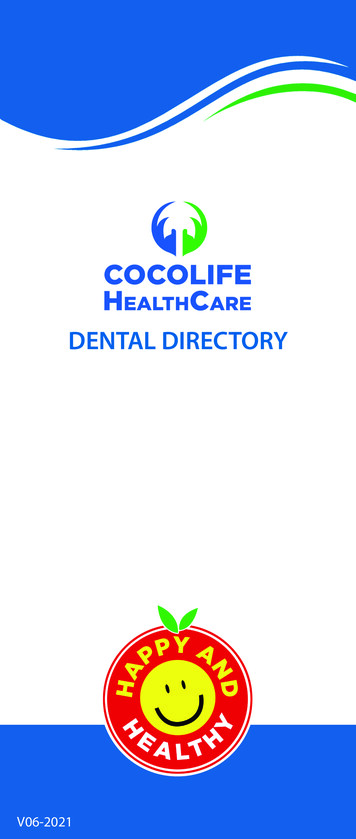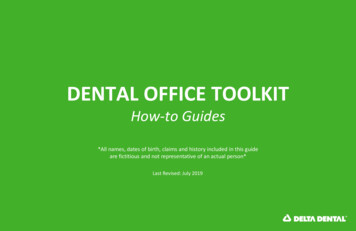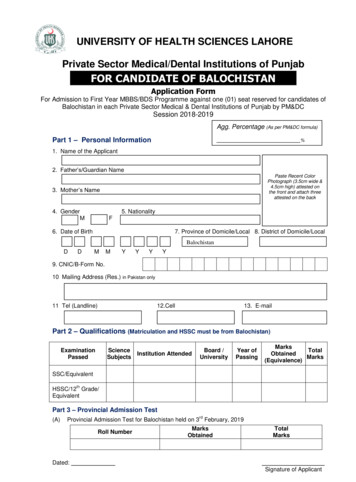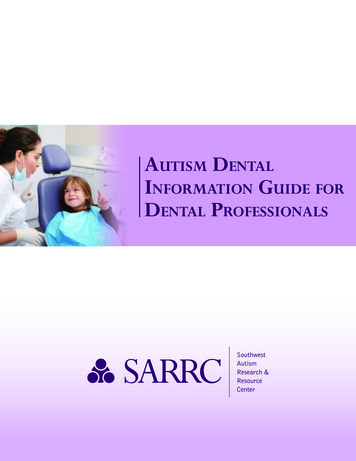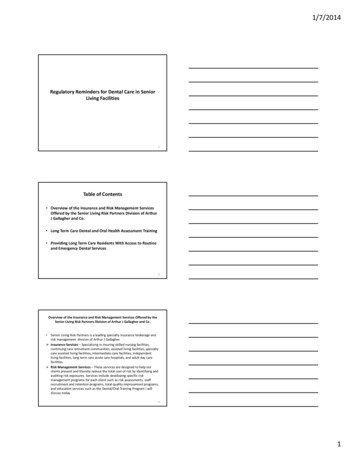
Transcription
1/7/2014Regulatory Reminders for Dental Care in SeniorLiving Facilities1Table of Contents Overview of the Insurance and Risk Management ServicesOffered by the Senior Living Risk Partners Division of ArthurJ Gallagher and Co. Long Term Care Dental and Oral Health Assessment Training Providing Long Term Care Residents With Access to Routineand Emergency Dental Services2Overview of the Insurance and Risk Management Services Offered by theSenior Living Risk Partners Division of Arthur J Gallagher and Co. Senior Living Risk Partners is a leading specialty insurance brokerage andrisk management division of Arthur J Gallagher. Insurance Services – Specializing in insuring skilled nursing facilities,continuing care retirement communities, assisted living facilities, specialtycare assisted living facilities, intermediate care facilities, independentliving facilitiesfacilities, long term care acute care hospitals,hospitals and adult day carefacilities. Risk Management Services – These services are designed to help ourclients prevent and thereby reduce the total cost of risk by identifying andauditing risk exposures. Services include developing specific riskmanagement programs for each client such as risk assessments, staffrecruitment and retention programs, total quality improvement programs,and education services such as the Dental/Oral Training Program I willdiscuss today.31
1/7/2014The Importance of Providing Proper Dental and Oral HealthCare to Long Term Care Residents The 2000 Surgeon General’s states that there is a silent epidemic of oral diseasesthat are affecting our most vulnerable citizens including the elderly. 23% of Americans between the ages of 65 and 74 have severe periodontal disease. Approximately 30,000 Americans are diagnosed annually with oral cancer of which8,000 people eventually die. These oral cancers are primarily diagnosed in theelderly. Oral problems can be cumulative and become more complex over time. Poor oral health has an impact on quality of life, overall health, and nutritionalstatus. Periodontal disease can contribute to or cause systematic diseases such asaspiration, malnutrition, pneumonia, endocarditis, and poor control of diabetes. Research has pointed to possible associations between chronic oral infections anddiabetes, heart and lung disease, and stroke. Many oral problems occur as side effects of medications.4Long Term Care Dental and Oral HealthAssessment Training5Long Term Care Facilities Developing and Using Oral HealthAssessment Tools to Assess Nursing Home Residents F250 Provision of Medically Related Social Services The facility must provide medically related social services to attain ormaintain the highest practicable physical, mental, and psychosocial well‐being of each resident. Factors with a potentially negative effect onphysical mentalphysical,mental, psychosocial well being include an unmet need fordental/denture care. Social Services must coordinate care with dentiststo ensure residents that need these services have access to dentalservices. Social Services should also coordinate dental services forresidents with family and staff including nursing, CNAs, and dietary.62
1/7/2014Long Term Care Facilities Developing and Using Oral HealthAssessment Tools to Assess Nursing Home Residents F272 ‐ Resident Assessment Regulation The facility must conduct initially and periodically a comprehensive,accurate, standardized assessment of each resident’s functional capacityto include dental and nutritional status. Dental condition status refers tothe condition of the teeth,teeth gumsgums, and other structures of the oral cavitythat may affect a resident’s nutritional status, communication abilities,or quality of life. The assessment should include the need for and use ofdentures or other dental appliances.7THE ORAL HEALTH STATUS SECTIONS OF THE MDSASSESSMENT MDS Sections K and L are completed to identify problem areas thatpertain to the oral status of each resident. These two areas are assessed when the resident is admitted, quarterly,annually, and when there is a significant change in the resident’s oralstatus. Assessing dental status can help identify residents who may be at risk foraspiration, malnutrition, pneumonia, endocarditis, and poor control ofdiabetes.8MDS SECTION K Section K0100: Swallowing Disorder Intent: To record any oral problems present in the last 7 days– Definition:– a).loss of liquid/solids from the mouth when eating or drinking,– b).holdingb) holding food in mouth/cheeks after eating,eating– c). coughing or choking during meals or when swallowing medications,– d). complaints of difficulty or pain with swallowing– z).None of the above– Assessment Steps: Ask the resident about difficulties in this area.Observe the resident during meals. Review the medical record for staffobservations about the resident; e.g., “pockets food,” etc. Inspect themouth for abnormalities that could contribute to swallowingproblems or pain with swallowing.93
1/7/2014MDS SECTION L Section L0200: Oral/Dental Status Intent: To document the resident’s oral and dental status as well as any problematicconditions.– A. Broken or loosely fitting full or partial dentures(chipped, cracked, uncleanable, or loose)– B. No naturall teethh off toothh fragments(edentulous)f( dl )– C. Abnormal mouth tissue(ulcers, masses, oral lesions, including under denture or partial ifone is worn)– D. Obvious or likely cavity or broken natural teeth– E. Inflamed or bleeding or loose natural teeth– F. Mouth or facial pain, discomfort or difficulty with chewing– Unable to examine– Z. None of the above were present Poor oral health has a negative impact on quality of life, overall health, and nutritionalstatus.10Long Term Care Facilities Developing and Using Oral HealthAssessment Tools to Assess Nursing Home Residents Sample Assessment Tool – Used to assess the oral status of the resident11F312 ADL CARE PROVIDED FOR DEPENDENT RESIDENTS F312 – Resident Quality of Care A resident who is unable to carry out activities of daily living receives thenecessary services to maintain good nutrition, grooming, and personalandd orall hhygiene.iServicesito maintaini i orall hygieneh imay includei l d brushingb hithe teeth, cleaning dentures, cleaning the mouth and tongue either byassisting the resident with a mouth wash or by manual cleaning with agauze sponge, and application of medication as prescribed.124
1/7/2014Caregiver Oral Hygiene Training Assess the Resident : Ask each resident how he or she feels about their overall oral health. Examine each resident's mouth for stained, broken, missing, or loose teeth; remove denturesand inspect for breaks, holes, cleanliness, and proper fit, check gums and soft tissue forinflammation and bleeding. Inspect toothbrushes, toothpaste for cleanliness and proper storage. Daily Resident Care: Residents teeth should be brushed every morning and evening. Maintaining Moisture in the Mouth Residents who are unconscious, unable to take fluids, breathe through the mouth, arefeverish, are vomiting, and have a nasogastric or gastrostomy tube should receive oralhygiene on a more frequent basis.13Caregiver Oral Hygiene Training Disease Process and How it Affects Oral Health Alzheimer’s Residents ‐ These residents may be unable to recognize a toothbrush or use itproperly. Therefore, oral hygiene should be administered without upsetting the resident sochoosing the time of day that the resident is most cooperative is important. Residents with Diabetes – These residents are more susceptible to oral infections of themouth. MedicationsM di tianddHHow ThThey AffAffectt OOrall HHealthlth Some medications have side effects that can cause dry mouth. Prior to the resident being treated by their dentist the facility should contact the attendingphysician to review current medications.14Oral Hygiene Education and Training for the LongTerm Care Resident F272 – Resident Assessment Regulation The facility must conduct initially and periodically a comprehensive,accurate, standardized assessment of each resident’s functional capacityto include dental and nutritional status. Dental condition status refers tothe condition of the teeth,teeth gums,gums and other structures of the oral cavitythat may affect a resident’s nutritional status, communication abilities ,orquality of life. The assessment should include the need for, and use ofdentures and other dental appliances. (Each resident must be assessed todetermine if they can cognitively follow instructions and to determine ifthey have the physical ability to self perform.)155
1/7/2014Oral Hygiene Education and Training for the LongTerm Care Resident Why Residents Should Do Daily Oral Hygiene To keep the mouth, teeth, gums, and tongue clean and healthy To prevent odor and infections To increase comfort and to make your food taste better Make Sure Residents Check Their Mouth Daily Look at gums for paleness, discoloration, bleeding, irritationLook at teeth for decay and loosenessCheck lips for dryness, cracking, swelling, and blistersInspect tongue for redness, swelling, irritation, sores, and white batchesClean dentures just as often as you would clean your natural teeth Teeth Should be Brushed Every Morning and Evening Report any Changes to Your Nurse16Additional Regulations (F‐Tags) That May Be Cited for Failure toProvide Appropriate Oral Care and Dental Services Comprehensive Care Plans: F279 – The facility must develop a comprehensive careplan for each resident (Dental needs should be addressed in the care plan.) Quality of Care: F309 – Each facility must receive, and the facility must provide, thenecessary care and services to attain or maintain the highest practicable physical, mental,and psychosocial well being, in accordance with assessment and care plan. Quality of Care: F325 –Based on resident’s comprehensive assessment the facility mustensure that a resident maintains acceptable parameters of nutritional status. Manyconditions of the mouth, teeth and gums can affect the resident’s ability to chew foods.17What is the Facility’s Regulatory Responsibility forTheir Residents Dental Care? Specific Regulatory Tags: 483.55 Dental Services Dental Services: F411 – the facility must provide or obtain from an outsideresource, routine and emergency dental services to meet the needs ofeach resident. Dental Services: F412 – the facility must provide or obtain from an outsideresource, the following dental services to meet the needs of eachresident: routine dental services and emergency dental services. Must, ifnecessary, assist the resident in making appointments and by arranging fortransportation to and from the dentist’s office and must promptly referresidents with lost or damaged dentures to a dentist.186
1/7/2014The Problem Approximately 69% of Alabama’s Skilled Nursing Facility residents rely onMedicaid as their primary health care source and Alabama Medicaid does notprovide dental services for adults. All states, except Alabama and 4 other states, provide dental services for theirsenior adults under their Medicaid Program. Oral health care for the elderly is under‐funded, under‐researched, and hasbeen a low health care priority. The downstream medical costs associated with poor oral care is a real issueand not fully understood or appreciated. Long Term Care Facilities must find a payment source for the dental servicesperformed.19The ProblemLong Term Care Facilities have historically had problems with scheduling dentiststo come to the facility to provide dental services for its residents. Scheduling a resident to see a dentist at his office can be difficult: Staff must locate a dentist that will see elderly patients Staff must transport these residents to the dentist’s office. (This often means oneor two staff members are unable to pperform their normal duties because theyy aretraveling to and from the dentist’s office. Additional dental services may be needed so this means that additional trips to thedentist must be scheduled. 20Finding a Solution to the ProblemWhat are the keys to implementing the solution for the residents?–There must be Access to Care: Access to dental care is limited and sometimes unavailable due to the lack of dentalproviders to treat residents and payment source for dental providers.–There must be a Payment Source for Care: The Oral Health in America Report stated:“The lack of dental insurance has emerged as a highly significant factorrelated to access to care”.Dental insurance must be part of the infrastructure to deliver access tocare.217
1/7/2014The Solution to the Problem Centennial Casualty Company, through the Healthy Seniors Dental Program, has specificallydesigned a dental insurance program for residents of long term care facilities to help facilitiesprovide access to routine dental services and emergency dental services for theseresidents. Alabama dentists and dental assistants provide dental services to residents of long term carefacilities right there at the facility. The Facility designates a Dental Facilitator to coordinate the dental visit with the DentalS iServicesProvider.P id The Dental Services Provider will set up a mobile dentist office at the facility to provide dentalservices for residents of that facility. The Dental Services Provider will appoint a Partner Relationship Coordinator to coordinatethe dental visits.– This coordination will identify the residents participating in the program receivingservices, the treatment orders needed, any pre‐treatment prescriptions needed, thedesignation and availability of a treatment room, and coordination of any follow‐uporders for residents.22The Solution to the Problem Residents not participating in the dental program can pay a fee to receive dental servicesduring the dental team’s visit to the facility.In‐Network dentists accept other dental insurance if they already file for that insurance intheir fixed office.Participating residents are allowed to see a Non‐Network Dentist.Long Term Care Facilities participating in the Healthy Seniors Dental Program are encouragedto offer the program to all long term care residents.23Routine and Emergency Dental Services Provided Diagnostic and Preventative Services such as oral exams, cleanings, and X‐Rays Basic Dental Services such as filling a cavity and extracting teeth Major Services such as providing dentures, adjusting dentures, cleaning dentures, reliningdentures, and repairing dentures. Emergency Dental Services There are no deductibles or copayments required by the resident as long as services areprovided by an In‐Network. If the residents decides to use a dentist, other than an In‐Network Dentist, there will be a 50annual deductible and the resident will be responsible for any charges in excess of theallowable charges of the insurance coverage.248
1/7/2014How does a Medicaid Resident Pay Their InsurancePremium? Federal law and regulations, as well as Alabama Medicaid Agency, consider the cost of healthinsurance premium, including dental insurance premium, to be a Medicaid “allowableexpense”.If the resident purchases and pays for dental insurance coverage, the resident will reduce thepayment to the facility for routine care by the same amount that he/she has paid for dentalinsurance coverage.The ppurchase and ppaymentyof the dental insurance coverageg should be reportedpto theMedicaid eligibility worker assigned to the case as soon as possible.Medicaid will then increase its payment to the facility by the amount of the dental insurancepremium.The monthly dental insurance premium will not reduce the current 30 allowed by Medicaidfor the resident’s personal needs each month.25Medicaid Resident Participation 94 9426We believe this program assists long term carefacilities with their responsibility toprovide dental and oral care for their residents. Our Alabama seniors are depending on us!279
Comprehensive Care Plans: F279 - The facility must develop a comprehensive care plan for each resident (Dental needs should be addressed in the care plan.) Quality of Care: F309 - Each facility must receive, and the facility must provide, the necessary care and services to attain or maintain the highest practicable physical, mental .

